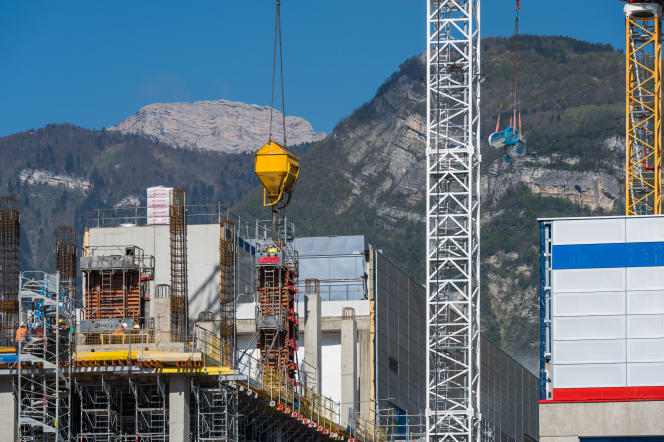This is substantial aid announced by the Minister of the Economy, Bruno Le Maire, on Monday June 5, allocated by the State for the expansion of the Isère factory of STMicroelectronics, i.e. 2.9 billion euros. . The Franco-Italian manufacturer, based in Crolles, in the Grésivaudan valley (Isère), 15 kilometers from Grenoble, produces precious semiconductors, the basic materials for electronic chips used in many strategic sectors (aeronautics, automotive, telecommunications…).
The project, costing a total of 7.5 billion euros, was formalized in July 2022, with the arrival of Emmanuel Macron on the Isère site of the industrialist. The challenge goes far beyond French borders, ST’s project being part of the European “Chips Act” strategy, which aims to double the European Union’s share of the semiconductor market by 2030, in the face of to the Chinese and American giants.
29,000m3 of water per day
In the Grenoble region, the expansion of the plant – on the site’s current footprint – immediately raised the question of water sharing, after a summer of 2022 marked by drought and orders restricting the use of the water. “We are sitting on a treasure”, recognizes Christophe Ferrari, president (ex-Socialist Party) of the Grenoble metropolis, which has 450,000 inhabitants. The capital of the Alps enjoys a abundant and pure water from glaciers and which requires very little treatment. And the many manufacturers based around Grenoble were not mistaken.
An abundance that benefits STMicroelectronics, its activity being very water-intensive. THE wafers (semiconductor discs) it produces are treated with chemicals, then rinsed with ultra-pure water – drinking water that has been demineralized and completely free of impurities. Water is also used for the air conditioning of buildings. Supplied by the metropolis of Grenoble, the STMicroelectronics plant alone used 6.8 million cubic meters of drinking water in 2022, i.e. 20% of the resource supplied by the metropolis of Grenoble, almost all of this volume being then rejected in the Isère after treatment.
In October 2021, a purchase agreement was signed between the metropolis of Grenoble and Grésivaudan, where the plant is located, recording the supply of 29,000 m3 of water per day for STMicroelectronics by the end of 2023, compared to 23,000 m3 until then. A volume constrained by the technical capacities of the city’s pipelines… but also by political choice. If they are delighted with the reindustrialization and the jobs created by ST, the elected ecologists and leftists of the Grenoble metropolis display their vigilance as to the impact of the industrial activity on the environment. “Water is not open bar”underlines Christophe Ferrari, who however ensures that the industrialist has not, to date, requested him to obtain more.
You have 55.67% of this article left to read. The following is for subscribers only.
